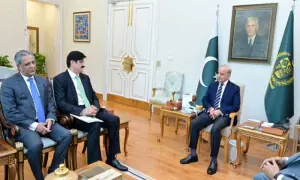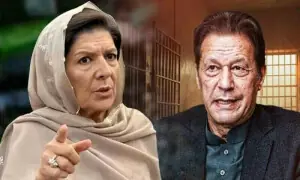Wana. Says. No. More.
6 min readThousands of men from different villages marched from Wana Bazaar Angoor Adda Road near Cadet College with black and white flags in South Waziristan, on Sunday, in the latest of what has been months of protests across the region to urge for peace in Khyber Pakhtunkhwa. Such a sight would have been a dream come true before 2014.
The difficulty with reporting on the Wana protests was not because reporters are not on the ground or the information is not clear. The reason these protests have been largely confined to social media is that they are about a tricky subject matter—what happens in a place where there has been a lot of messy fighting. If you even try to describe the aftermath you risk making accusations against one side or the other. In this case, even admission of a problem can rankle.
The truth is, however, that these men in Wana came out to protest after they grew alarmed over a video on social media of a man called Commander Tiger of the Mullah Nazir group. In it, ‘Commander Tiger’ stated that his group would take control of Wana from November 15 (tomorrow) to run the system or nizam (in a set-up parallel to the administration). Mullah Nazir was killed in a US drone attack in 2013, after which it is believed that his group split into four factions.
There was so much concern over the video that a group of elders (amaedeen) will be meeting the government on November 19 to discuss the matter. The protest was to publicly show that the people of Wana did not endorse the return of militancy and backed the police and administration whose job they believe is to maintain law and order. If the government wanted an endorsement, it need look no further.

And while Wana Assistant Commissioner Yasir Kundi confirmed that the people were demanding the maintenance of peace, it was surprising to hear him downplay the protest. “Wana has a population of 300,000 and if 2,000 people protest then it’s not a big deal,” he told Aaj News on Monday. “Thank God, peace is maintained in South Waziristan by the sacrifices of the security agencies and public police. murder and robbery happen everywhere, it does not mean that there is no peace. Some elements trigger such incidents.”
Assistant Commissioner Kundi conceded that protesting was the people’s right but the administration was not neglecting its duty.
The Wana Uwalsi Pasoon had organised the protest against what it said was unrest, target killings, extortion and kidnapping in Waziristan. Local leaders of several political parties, the PTI, ANP, JI, NDM, PTM, PkMAP, and PPP took part. One major political party, the JUI, was notably absent.
They were of the view that peace in the area was contingent on posting separate district police officers, district commissioners, open a judicial complex in Wana. South Waziristan was part of Fata, but after the law was changed (the 25th Constitutional Amendment), the responsibility of maintaining law and order came to lie with the civil administration and security forces.
What are the demands in Wana?
The protestors quoted Article 9 (security of person) and Article 18 (freedom of trade, business, or profession) as rights under the Constitution as they made their demands:
- A ban should be imposed on all “armed groups”
- Action against troublemakers
- Protection of people, contractors, and traders
- S. Waziristan police should get help from security institutions and agencies. They should be empowered and be given equipment
- Immediate release of Tariq Wazir, a contractor’s brother who was kidnapped
Wazir is the brother of a local contractor. Locals claim he was abducted by militants two weeks ago. They claimed that troublemakers do this to “make their presence felt” in the area and this is how they sow fear.
Over the past many months, parliamentarians have been attacked, given threats, security officers targeted, and people harassed.
‘Peace is fully restored’
DPO South Atiq Wazir told Aaj News that the situation in Wana was under complete control, and that security personnel and police were present.
“Peace is fully restored,” he said and claimed that a couple of incidents are exaggerated by some people. The police were present everywhere in the area and were fully prepared to deal with any aggression. “The peace is maintained by the police who have made sacrifices and continuing to do so,” Wazir said.
Truth and reconciliation: Pashteen
Even Manzoor Pashteen of the Pashtun Tahafuz Movement concurred that the protest in Wana was prompted in part by the video that made the rounds on social media. According to him, people saw this video as “solid evidence” that trouble was afoot.
But the protest in Wana is just the latest in a series that have been held across Pashtun areas for two months. According to Pashteen, people in Swat, Buner, Dir, Bajaur, Mohmand, Khyber, Kurram, Waziristan, Lakki Marwat, and Bannu have raised similar concerns. “You would have seen that people have been coming out, back to back, and were vocally opposed to the unrest,” he said.
“In our areas, we will neither allow any organisation or group nor consider any of them worthy of the [running the] administration except for our civil administration and police,” he told Aaj News, referring to the video. “It is not acceptable to us.”
In his opinion, these protests are linked to what he describes as the “maneuvers” of the outlawed Taliban since the peace talks.
When asked how useful protesting would be, Pashteen said: “Hum bebas log hain. Hum agar zor ka taqat nahi rakhtay, to shor ka to rakhte hain.” We are helpless. We cannot apply force but we can speak up.
“We will use all the ways of resistance available to us. This is not a comparison of powers, it is the war for our survival,” Pashteen said. They did not want another generation of children to open their eyes to war and conflict. The protestors want to impress upon the authorities that policies that endanger lives are not pursued.
“So far, a few demands have been met, like check posts or the release of missing persons,” he said. But much more work has yet to be done.
Pashteen added that the protest was also held for the protection of the police, which has been the first line of defence in the province. He demanded that a truth and reconciliation commission must be formed. Incidentally, the call for truth and reconciliation commissions is not a new one. On October 19, this year Sherry Rehman said one was needed for Balochistan, given the heavy price Pakistanis had paid in the fight against terrorism. APP reported her as saying terrorists could not be allowed to raise their ugly heads again in Swat or other areas.
For the latest news, follow us on Twitter @Aaj_Urdu. We are also on Facebook, Instagram and YouTube.
























Comments are closed on this story.